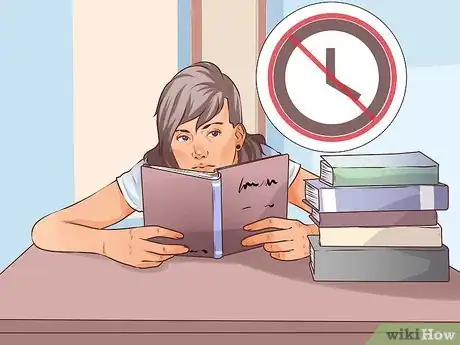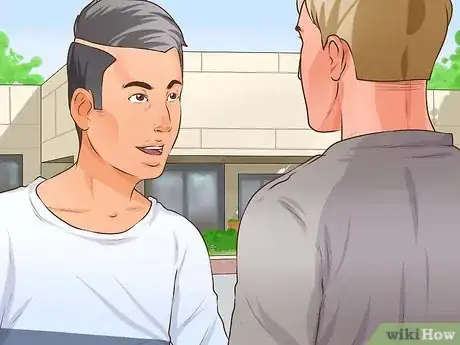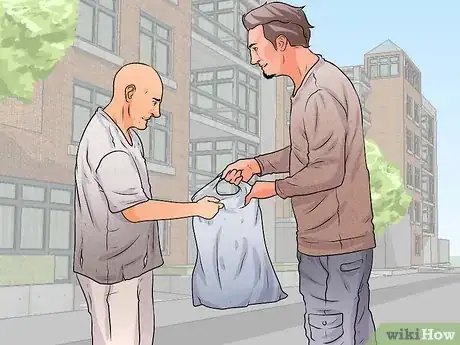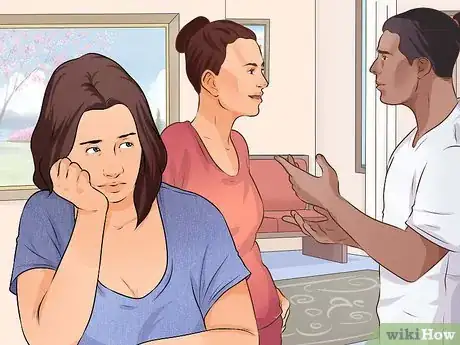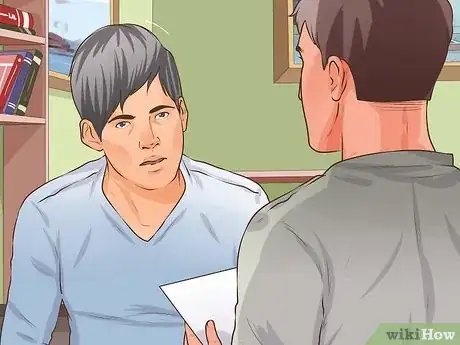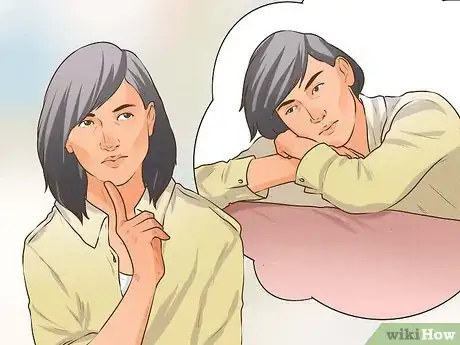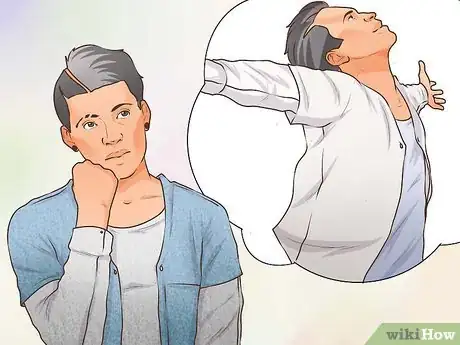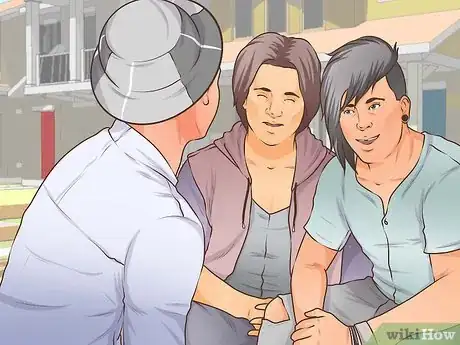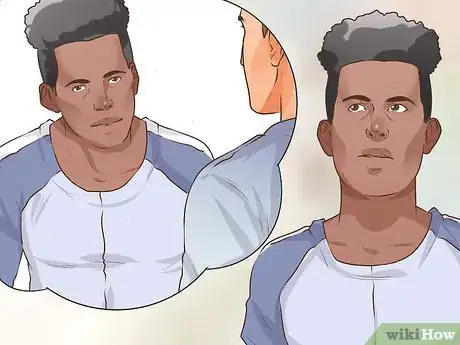This article was co-authored by Donna Novak, Psy.D. Dr. Donna Novak is a Licensed Clinical Psychologist based in Simi Valley, California. With over ten years of experience, Dr. Novak specializes in treating anxiety and relationship and sex concerns. She holds a BA in Psychology from the University of California, Los Angeles (UCLA) and a doctoral degree (Psy.D) in Clinical Psychology from Alliant International University-Los Angeles. Dr. Novak uses a differentiation model in treatment that focuses on personal growth by increasing self-awareness, personal motivation, and confidence.
There are 12 references cited in this article, which can be found at the bottom of the page.
wikiHow marks an article as reader-approved once it receives enough positive feedback. In this case, several readers have written to tell us that this article was helpful to them, earning it our reader-approved status.
This article has been viewed 1,117,143 times.
As the world gets more and more connected, it actually becomes easier to feel left out. Do you often find yourself feeling that way? You're not the only one, that's for sure. You may be wondering how to go about tackling these feelings of loneliness. First, you have to have a better understanding of yourself. Then, you can start making changes to overcome your feelings of loneliness.
Steps
Taking Action
-
1Do stuff that makes you feel good. Doing things you are passionate about can relieve your feelings of loneliness. Think about what makes you feel good. Meditating? Reading European literature? Singing? Go for it. Take some of your precious time and spend it nurturing your passions. Or, ask a peer from school, a buddy at the gym or your neighbor if they want to join you. New friend made.[1]
- Refrain from using substances to dull the pain of feeling lonely. Find healthy activities that make you feel good - not just temporary fixes that only cover the wound.
-
2Get busy. Do things to consume your time. When your schedule is full of activities that keep you productive and distracted, you won't have the time to dwell on the fact that you are lonely. Volunteer. Find a part-time job. Join a book club, or a new gym with interesting group classes. Tackle a few DIY projects. Just get out of your head. [2]
- What hobbies do you enjoy? What are you naturally good at? What have you always wanted to do that you've never gotten around to doing? Take this opportunity and do it.
Advertisement -
3Change your surroundings. It's easy to sit at home and allow the day to pass with the cast of your favorite sitcom. However, when you remain in the same environment, the pangs of loneliness will only get worse. Go to a cafe to do your work. Go to the park and simply sit on a bench to watch the passersby. Give your brain some stimuli to distract you from your negative feelings.
- Spending time in nature can have a positive impact on your mental health.[3] Getting outside can actually reduce stress, and may also help improve your physical health as well. So, grab a blanket and read a book on the park grass. Doing this regularly just might lift your spirits.
-
4Watch out for warning signs. Sometimes, you may be so desperate to get past your feelings of loneliness that you'll take just about any chance that offers itself to be less lonely. Be careful not to seek out bad influences or people who only want to use you. Sometimes, the vulnerability that comes with being lonely can make you a target of manipulative or abusive people. Signs of people who are not interested in a healthy, mutual relationship include:
- They seem "too good to be true." They call you all the time, plan all of your activities, and seem perfect. Often, these are early warning sign of abusive people who want to take control of your actions.
- They don't reciprocate. You may pick them up from work, do them a favor on the weekend, etc., but somehow they never manage to return the favor. These people are taking advantage of your vulnerability to profit.
- They get moody when you try to spend time elsewhere. You may be so excited to interact with another person that their controlling behavior doesn't initially bother you. However, if these people check in on you, try to keep track of where you go and who you're with, or express concern that you have friends other than them, this is a warning sign.
-
5Concentrate on your loved ones. Though it can be hard for those who crave independence, sometimes, we have to depend on others. If you're feeling lonely, reach out to a relative or friend you trust - even if they're a thousand miles or more away. A simple phone call can lift your mood.
- If you're going through a hard time, maybe your loved ones don't even know. And, you don't have to tell them all your feelings if you don't feel comfortable. Share what feels comfortable for you. Your loved ones will probably feel honored that you shared your feelings with them.
-
6Find people that are like you. The easiest place to start is the internet. There are plenty of resources to connect with others, like local Meetups.[4] [5] Try to connect with people who share the same hobbies or interests as you. Think about what books and movies are your favorite, or where you are from or currently living. There are groups to fit every situation.
- Just go looking for opportunities to socialize and take them. Search online for a group fitness class. Find a group of comic book aficionados. Sign up for that intramural league you've been contemplating at work. Get involved in something. Create opportunities. Initiate conversations. It's the only way these patterns of loneliness will change.[6]
- This may involve getting out of your comfort zone - but you have to think of it as a good thing, a challenge. And if you don't like it, you can opt out. More than likely, you won't be hurt from the situation, but you can learn something from it.
-
7Get a pet. People need connection so much that they've been breeding furry companions for over 30,000 years.[7] And if Tom Hanks can live with Wilson for years, you could certainly benefit from a dog or a cat. Pets can make terrific companions. Just make sure you don't substitute their company for people. Try to maintain a few human connections so that you have others to talk to and lean on in trying times.
- Don't pay thousands of dollars for a dog. Go to your local humane society or pet shelter and rescue a pet that needs a good home.
- Research shows that, aside from companionship, pets can improve your psychological well-being and even help you live longer.
-
8Think about others. Social research suggests a connection between self-focus and loneliness. This doesn't mean you shouldn't reflect on your emotions, but it does mean you shouldn't let that become your sole focus. If you extend your focus to others, your loneliness may fade. Studies suggest that volunteering, for example, helps people feel more socially connected and emotionally fulfilled, which fights feelings of loneliness[8]
- The simplest way to extend your focus is to find a group of people you can help. Volunteer at a hospital, soup kitchen, or homeless shelter. Join a support group. Get involved with a charity. Be a big brother or sister. Everyone out there is fighting a battle; maybe you could help them with theirs.
- You could even look for ways to help others who may be lonely. The infirm and the elderly are often shut-in away from social interaction. Volunteering to visit an elder care home or "candy stripe" in a hospital could help you diminish someone else's loneliness, too.
Changing Your Thinking
-
1Express your feelings to yourself. Keeping a journal can help you understand where your feelings of loneliness are coming from. For example, if you have a large number of friends, you may feel confused that you still feel lonely. Track when you have these feelings in your journal. When do they appear? What do they look like? What is happening around you when you feel this way?
- For example, perhaps you just moved out of your parents' house to a new city. You have a group of new friends from work whom you enjoy, but you still feel lonely in the evenings when you come home to an empty house. This suggests that you are looking for someone you can have a stable, strong emotional connection to.
- Understanding the source of your loneliness can help you take action to fight it. It can also make you feel better about your feelings. In this example, understanding that you enjoy your new friends but miss the connection you had to your family when you lived with them allows you to acknowledge that what you're feeling is natural.
-
2Reframe your negative thoughts. Pay attention to the loop of thoughts going through your head during the day. Focus on any thought you have about yourself or other people. If the thought is negative, try to reword it and add a positive spin: "No one at work understands me," becomes "I haven't made a connection at work with anyone...yet."[9] [10]
- Reframing your self-talk can be an incredibly challenging task. Oftentimes, we are not even aware of all the negative thoughts we have in a day. Spend ten minutes a day trying to just notice your negative thoughts. Then, attempt to reframe negative thoughts into more positive ones. Then, work your way up until you spend all day monitoring your self-talk and taking control. Your entire perspective may change after successfully doing this exercise.
-
3Stop thinking in terms of black and white. Such thinking is a cognitive distortion that needs to be addressed. Thinking in all-or-none terms like "I am lonely now, so I will always be lonely" or "I don't have anyone who cares about me" will only hinder your progress by making you feel more miserable.
- Challenge these thoughts when they come to mind. For instance, you can probably think of a few times when you did not feel so lonely. You made a connection with someone, if only for a minute, and you felt understood. Acknowledge and accept that statements derived from black and white thinking just aren't complex enough to reflect the truth of our rich emotional lives.
-
4Think positively. Negative thinking can lead to a negative reality. Your thoughts often create a self-fulfilling prophecy. If you think negatively, your perception of the world will be negative, too. If you walk into a party thinking no one will like you and you won't have fun, you'll spend the entire party on the wall, making zero connections and not having fun. On the contrary, with positive thinking, positive things can happen.
- The opposite is true, too. If you expect things to go well, they often do. Test out this theory by making a positive assumption about a situation in your life. Even if the results aren't absolutely wonderful, you may not feel so bad about things if you go into the situation with a positive mindset.
- A great way to practice positive thinking is to simply surround yourself with positive people. You will notice how these individuals view life and others and their positivity just may rub off on you.[11]
- Another tactic for positive thinking is to avoid saying anything to yourself that you wouldn't say to a friend. For example, you would never tell a friend that the person is a loser. So, if you find yourself thinking "I am a loser," correct this harsh comment by stating something nice about yourself like "I make mistakes sometimes, but I am also intelligent, funny, caring, and spontaneous."
-
5See a professional. Sometimes, loneliness is a symptom of a greater problem. If you feel like the entire world just doesn't get you and you just can't seem to see any gray area in your black and white thinking, you may benefit from seeing a therapist or counselor.
- Persistent feelings of loneliness can sometimes be an indicator of depression. Seeing a mental health professional for a proper evaluation may help you to recognize signs of depression and adequately treat this disorder.
- Just talking to someone about your situation can help. It can give you perspective on what's normal and what's not, what you can do to feel more social, and how much better you may feel just by changing up your routine.
Understanding Yourself
-
1Identify your type of loneliness. Loneliness can take on a few different forms and may manifest differently in each person. For some people it's an inkling that comes and goes intermittently, for others it's a nonstop part of their reality. You may have more social loneliness, or more emotional loneliness.
- Social loneliness. This type of loneliness includes feelings like aimlessness, boredom, and social exclusion. It can happen when you don't have a solid social network (or if you've been separated from one, such as moving to a new place).
- Emotional loneliness. This type of loneliness includes feelings like anxiety, depression, insecurity, and desolation. It can happen if you don't have the strong emotional connections with people that you'd like to.
-
2Realize that loneliness is a feeling. A central and mandatory step towards combating loneliness is knowing that, while it may be painful, it is just a feeling. It is not necessarily fact and, therefore, it is not permanent. Proverbially speaking: "this, too, shall pass." It has nothing to do with you as a social creature and everything to do with those little neurons in your head firing in an unfortunate, yet changeable, way. You can easily attack your thoughts about loneliness and feel better.
- Ultimately, you decide what to make of your situation. Take this as an opportunity to better understand yourself and make improvements. Evolutionary understanding of loneliness suggests that the pain it causes can fuel you to take action and become someone you'd never otherwise be able to become.
-
3Consider your personality. Loneliness for an extrovert and loneliness for an introvert are two very different things. Loneliness and being alone aren't the same thing. Think about what the opposite of loneliness would look like for you, and remember that it looks different for each person.[12]
- Introverted people may desire having a close relationship with one or two people. They may not need to see these friends everyday. Instead, they may enjoy spending time in solitude for the most part and only require the stimulation of others every now and then. However, if their social and emotional needs are not met, introverts can still feel lonely.[13]
- Extroverted people may need to be around a group of people to feel like their social meter is getting adequately filled. They may feel down when they are not interacting with others who provide stimulation. If their connections are not socially and emotionally fulfilling, though, an extrovert can feel lonely even surrounded by people.[14]
- Where do you fall on the spectrum? Understanding how your personality impacts your feelings of loneliness can guide you in making decisions about how to overcome these feelings.
-
4Recognize that you are not alone in feeling lonely. A recent survey revealed that one in every four individuals surveyed described themselves as having no one to talk to about personal matters. When family members were removed from the pool of confidants, that number increased to half the population of respondents. This means that, if you're feeling lonely like you have no one to turn to, between 25 and 50 percent of Americans feel similarly to you.
- Scientists are now referring to loneliness a public health concern.[15] Recent studies have shown that people who feel isolated, either by physical distance or subjectively, may die earlier than those who do not.
Expert Q&A
Did you know you can get expert answers for this article?
Unlock expert answers by supporting wikiHow
-
QuestionI moved somewhere new and now I'm lonely. What should I do?
 Donna Novak, Psy.DDr. Donna Novak is a Licensed Clinical Psychologist based in Simi Valley, California. With over ten years of experience, Dr. Novak specializes in treating anxiety and relationship and sex concerns. She holds a BA in Psychology from the University of California, Los Angeles (UCLA) and a doctoral degree (Psy.D) in Clinical Psychology from Alliant International University-Los Angeles. Dr. Novak uses a differentiation model in treatment that focuses on personal growth by increasing self-awareness, personal motivation, and confidence.
Donna Novak, Psy.DDr. Donna Novak is a Licensed Clinical Psychologist based in Simi Valley, California. With over ten years of experience, Dr. Novak specializes in treating anxiety and relationship and sex concerns. She holds a BA in Psychology from the University of California, Los Angeles (UCLA) and a doctoral degree (Psy.D) in Clinical Psychology from Alliant International University-Los Angeles. Dr. Novak uses a differentiation model in treatment that focuses on personal growth by increasing self-awareness, personal motivation, and confidence.
Licensed Clinical Psychologist Make sure you're finding time to connect with people from back home. At the same time, come up with plans to meet and connect with people. That can involve looking into some groups in the area, like Meetups. I would also recommend having a really good self-care plan. It's important that you do things you enjoy every day. Keep up with any hobbies you enjoyed before you moved. Don't let those go. Things like exercise and meditation can be great. Remember that this feeling is temporary. You'll eventually meet people, connect, and move forward.
Make sure you're finding time to connect with people from back home. At the same time, come up with plans to meet and connect with people. That can involve looking into some groups in the area, like Meetups. I would also recommend having a really good self-care plan. It's important that you do things you enjoy every day. Keep up with any hobbies you enjoyed before you moved. Don't let those go. Things like exercise and meditation can be great. Remember that this feeling is temporary. You'll eventually meet people, connect, and move forward. -
QuestionHow does exercise make you feel better?
 Chloe Carmichael, PhDChloe Carmichael, PhD is a Licensed Clinical Psychologist who runs a private practice in New York City. With over a decade of psychological consulting experience, Dr. Chloe specializes in relationship issues, stress management, self esteem, and career coaching. She has also instructed undergraduate courses at Long Island University and has served as adjunct faculty at the City University of New York. Dr. Chloe completed her PhD in Clinical Psychology at Long Island University in Brooklyn, New York and her clinical training at Lenox Hill Hospital and Kings County Hospital. She is accredited by the American Psychological Association and is the author of “Nervous Energy: Harness the Power of Your Anxiety” and “Dr. Chloe's 10 Commandments of Dating.”
Chloe Carmichael, PhDChloe Carmichael, PhD is a Licensed Clinical Psychologist who runs a private practice in New York City. With over a decade of psychological consulting experience, Dr. Chloe specializes in relationship issues, stress management, self esteem, and career coaching. She has also instructed undergraduate courses at Long Island University and has served as adjunct faculty at the City University of New York. Dr. Chloe completed her PhD in Clinical Psychology at Long Island University in Brooklyn, New York and her clinical training at Lenox Hill Hospital and Kings County Hospital. She is accredited by the American Psychological Association and is the author of “Nervous Energy: Harness the Power of Your Anxiety” and “Dr. Chloe's 10 Commandments of Dating.”
Licensed Clinical Psychologist
Warnings
- Avoid negative situations. It's a bad idea to drink heavily, do drugs, or spend your life in front of the television. It's a doubly bad idea to do so if you're in a bad mood or feeling particularly lonely. See a psychologist if your loneliness does not go away with the above steps.⧼thumbs_response⧽
References
- ↑ Donna Novak, Psy.D. Licensed Clinical Psychologist. Expert Interview. 8 December 2020.
- ↑ https://www.utdallas.edu/counseling/loneliness/
- ↑ http://www.takingcharge.csh.umn.edu/enhance-your-wellbeing/environment/nature-and-us/how-does-nature-impact-our-wellbeing
- ↑ http://www.meetup.com/
- ↑ Donna Novak, Psy.D. Licensed Clinical Psychologist. Expert Interview. 8 December 2020.
- ↑ http://www.up.edu/healthcenter/default.aspx?cid=5060&pid=1802
- ↑ http://www.the-scientist.com/?articles.view/articleNo/38279/title/Origin-of-Domestic-Dogs/
- ↑ http://www.health.harvard.edu/blog/volunteering-may-be-good-for-body-and-mind-201306266428
- ↑ http://www.academia.edu/1097848/Stress_and_Coping_Activity_Reframing_Negative_Thoughts
- ↑ Donna Novak, Psy.D. Licensed Clinical Psychologist. Expert Interview. 8 December 2020.
- ↑ http://www.mayoclinic.org/healthy-lifestyle/stress-management/in-depth/positive-thinking/art-20043950?pg=2
- ↑ http://www.myersbriggs.org/my-mbti-personality-type/mbti-basics/extraversion-or-introversion.htm
- ↑ http://www.myersbriggs.org/my-mbti-personality-type/mbti-basics/extraversion-or-introversion.htm
- ↑ http://www.myersbriggs.org/my-mbti-personality-type/mbti-basics/extraversion-or-introversion.htm
- ↑ http://time.com/3747784/loneliness-mortality/
- ↑ http://spp.sagepub.com/content/4/5/579.abstract
About This Article
Everyone feels lonely sometimes, but there are many things you can do to make yourself feel better, such as staying busy with hobbies. Consider reading a book or starting a DIY project, which should distract you from your negative feelings. It's natural to feel lonely when you're stuck in the same place for too long, so try taking a walk or going to a coffee shop for a change of scenery. You might also consider volunteering at a charity, since doing things for other people often makes us feel less lonely. If you want regular company around the house, look into getting a pet, like a dog or cat, which will keep you busy and give you affection. For more tips from our co-author, including how to think positively about feelings of loneliness, read on!


